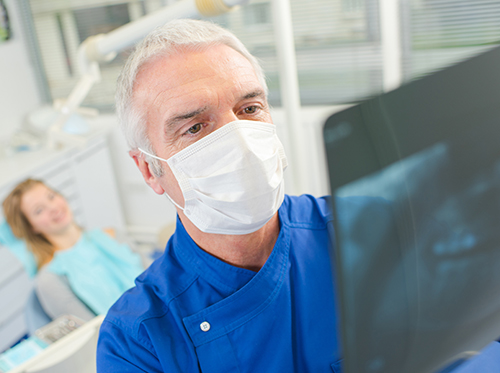Dental X-Rays: Are They Safe?
October 11th, 2023

X-rays have been a function of dental healthcare for a long time. That in and of itself should be good news, because it means we've had plenty of time to improve them. While there is always some risk in exposure to radiation, dental X-ray exposure has decreased significantly due to all the advances in technology. So there’s risk, but X-rays are quite safe.
Think of X-rays as you would about a car. Automobiles these days have all kinds of technology to make them as safe as possible. There's still a chance that you’ll suffer an accident. Would you stop using a car because of that risk? When it comes to dental X-rays, Drs. Rottschalk, Acker, and Froidcoeur and our team believe the positives clearly outweigh the negatives.
X-rays can be done digitally or with film. For film, X-rays require different exposures at different speeds to produce the image. Digital X-rays have software that automatically adjusts the exposure and produces the X-ray in a digital file. Since they substantially reduce your exposure to radiation, digital X-rays are the current standard in dental offices.
In addition to digital X-rays, lead aprons are an essential piece of X-ray safety. They help protect internal organs from X-rays by acting as a shield. They usually come with a thyroid collar as well, since that is one of the most vulnerable areas to X-rays in the body. Lead aprons can absorb up to 95% of any scatter rays that result from an X-ray. Not bad, right?
Although dental X-rays involve some radiation exposure (not all of it can be eliminated), so does everyday life. Getting too much sun, for example, can be dangerous. The truth is, we accumulate radiation in our bodies over a lifetime, so it’s worthwhile to be aware and avoid as much unnecessary exposure as possible. When it comes to your dental health, though, getting an X-ray — especially when your doctor says you need it — offers more benefits than risks.
Ask us about the type of dental X-rays we use during your next visit to our Fairview Heights, IL office!
Caring for Your Night Guard
October 4th, 2023

You might have experienced painful morning headaches. Or have a partner or housemate who begged you to please keep those grinding noises down at night. Or perhaps you were unhappily surprised to find that your teeth had mysteriously become worn, loose, or cracked.
So you made an appointment at our Fairview Heights, IL office. And you learned that you needed a night guard designed to protect your teeth from the damage done by night time bruxism—that grinding and clenching which is hard on enamel, bad for teeth, and painful for jaws. Good work!
Your night guard prevents your teeth from making contact, saving teeth and enamel from injury. It distributes the pressure placed on your teeth, muscles, and bones when your jaws clench through the night. Bonus: it can reduce nocturnal noises caused by grinding.
Guards are available over-the-counter in general sizes, or a custom night guard can be created for you by Drs. Rottschalk, Acker, and Froidcoeur. Custom guards are uniquely fitted to your teeth and jaw, and last longer than over-the-counter models. Whichever kind of appliance you choose, daily care is a must for a long and healthy partnership.
To make sure you get the best and longest use from your night guard, there are some easy steps to keep it in top shape when it’s off-duty.
- Keep It Clean
Plaque and bacteria can build up on your night guard just as they can on your tooth enamel. Rinse your guard in the morning and brush it gently. Ask Drs. Rottschalk, Acker, and Froidcoeur about using toothpaste, because toothpastes, especially abrasive toothpastes, can scratch your appliance. And don’t forget to clean your case!
Every week, or as directed, your night guard will benefit from a more serious cleaning. Follow the instructions for your appliance, whether it’s using cleaning tablets, a soaking solution, or another recommended cleanser. Your dentist can suggest how, how long, and how often to treat your night guard to a deep cleaning, because using the wrong products or cleaning methods can damage it.
- Keep It Dry
Putting a damp night guard into a closed case, even a ventilated one, provides an ideal setting for bacteria growth. Before you put your guard away, give it time to air-dry on a clean surface.
- Keep It Safe
Once your guard is clean and dry, make sure it keeps its shape and stays intact by keeping it in its clean, dry case when you’re not using it. Night guards and their cases are no fans of sun, extreme heat, very hot water, or (gulp!) dishwashers. A misshapen, melted, or broken night guard should not be used. If your night guard is damaged, it’s time to call us.
Spending just a moment or two each day caring for your night guard will result in a long-lasting appliance and many hours of healthy and comfortable sleep. Your night guard is protecting you. Be sure to return the favor for a long and healthy dental partnership.
Quit Smoking to Save Your Smile
October 4th, 2023

You have probably counted a hundred reasons to stop smoking. It’s unhealthy. It’s expensive. It annoys the people around you. You have to schedule your day around the next cigarette. But here’s reason number 101: Did you know that one of the many side effects of smoking is the damage it does to your smile?
Your Appearance
One of the most obvious results of smoking is the constant yellowing and discoloration of your teeth. Tobacco stains can take longer to remove with home brushing and whitening. And, while a professional cleaning and whitening will make a world of difference, all that good work is undone once you start smoking again.
More important, no smile looks its best with periodontal disease and tooth loss. Smoking has been linked to the presence of more harmful oral bacteria and higher occurrences of cavities and gingivitis (early gum disease). Periodontitis, or severe gum disease, is much more common among smokers. Tooth loss is also much more likely.
Healing after Dental Surgery
Smoking slows the healing process. It has been linked to a weaker immune system, so it’s harder to fight off an infection or to heal from one. And because of the harmful effect of smoking on bone tissue, there is a higher failure rate for dental implants among smokers. Bone density can be so compromised that an implant is not even an option.
Healing after Extractions
If you have a tooth extracted, the formation of a blood clot at the site of the removal is essential to avoid a condition called dry socket. Dry socket can lead to pain, serious infection, and other complications. Luckily, this clot is resilient and pretty hard to dislodge—unless you apply suction such as sipping through a straw or drawing smoke from a cigarette.
Oral Cancer
Research has shown that smoking is the single most serious risk factor for oral cancer. The good news is that this risk is cut dramatically if you quit!
Let Drs. Rottschalk, Acker, and Froidcoeur help you maintain your smile. We can offer many more reasons to give up the smoking habit, and we are happy to offer suggestions for quitting during your next visit to our Fairview Heights, IL office. We want to protect your smile and your health as well. It doesn’t really matter which number on the list finally leads you to quit—every number on that list is your lucky number!
What to Do for Your Loose Tooth
September 27th, 2023

One of the first exciting childhood experiences we outgrow is the excitement of discovering a loose tooth. Sadly, there’s no adult Tooth Fairy waiting to exchange a gift for a lost tooth, and, even worse, there’s no backup tooth all set to replace it.
If one of your permanent teeth is feeling a little less than permanent, don’t ignore the problem! Here are four things to do right away when you discover a loose tooth:
Eat Soft Foods
While you’ll probably automatically take caramels off the menu and ditch your chewing gum, crunchy foods such as nuts, chips, even apples can be a problem for a compromised tooth. Stick with soft foods and try to eat on the opposite side of your loose tooth.
Keep the Area Clean
The typical bacteria and food particles in your mouth won’t thoughtfully leave the area around your wiggly tooth untouched. But your normal brushing and flossing might be a little too much for a loose tooth. Gently rinsing with warm water should do the trick until you can see us.
Leave It Alone
Sometimes the hardest thing to do is to do nothing. But when it comes to a loose tooth, please choose this course of (in)action. You might recall having a loose tooth as a child, and how you’d automatically wiggle it with your tongue or your fingers. But you’ll also remember what happened at the end of all that wiggling—your baby tooth fell out.
Teeth are held in place by ligaments attached to the alveolar bone in the jaw. When those ligaments or bone are damaged because of injury or infection, your tooth feels loose. Wiggling your tooth back and forth can cause further detachment and expose you to more bacteria. So even though it might be tempting, leave your tooth alone until you can see us.
Call Your Dentist Immediately
The most important tip of all! Call Drs. Rottschalk, Acker, and Froidcoeur at once if you notice a loose tooth. It’s important to discover not only the best treatment, but the reason for your loose tooth as well. A loose tooth can be caused by several different conditions, and none of them should be ignored.
- A blow to your mouth
If your tooth, ligaments, or bone have suffered trauma, your dentist might be able to stabilize your loose tooth with a splint so that ligament and tissue can heal.
- Gum disease
Periodontitis (severe gum disease) is a chronic condition. Pockets form between your gums and teeth that become home to bacteria and infection. Over time, periodontitis can destroy gum, ligament, and bone tissue. Left untreated, it leads to loose teeth and even tooth loss. Gum disease is reversable when caught early enough, and even in later stages can respond well to a variety of treatments.
- Pregnancy
Hormonal changes during pregnancy can cause the ligaments and bones around your teeth to loosen, and loose teeth are the result. While this situation is usually temporary, taking care of your teeth and gums is essential during pregnancy, and Drs. Rottschalk, Acker, and Froidcoeur will have many important recommendations for your dental health.
- Teeth Grinding (Bruxism)
Your jaw and teeth can exert hundreds of pounds of pressure. When you spend your sleep hours grinding them, that force is applied to your teeth and the ligaments holding them. Small wonder that bruxism can lead to loose teeth. Your dentist will have ideas to help you stop teeth grinding, from behavioral changes to custom night guards.
Osteoporosis, bite problems, oral cancer, and other conditions can also cause loose teeth. Any condition that causes loose teeth should always be evaluated immediately to prevent more serious medical or dental problems.
Sometimes a loose tooth can’t be saved, and a professional extraction is the best solution. But if there’s a chance to save your tooth, treating the tooth carefully and visiting our Fairview Heights, IL office at once improve your odds considerably. Because there’s no adult Tooth Fairy, and really, no coins under a pillow will ever be as valuable as a beautiful, healthy smile.





